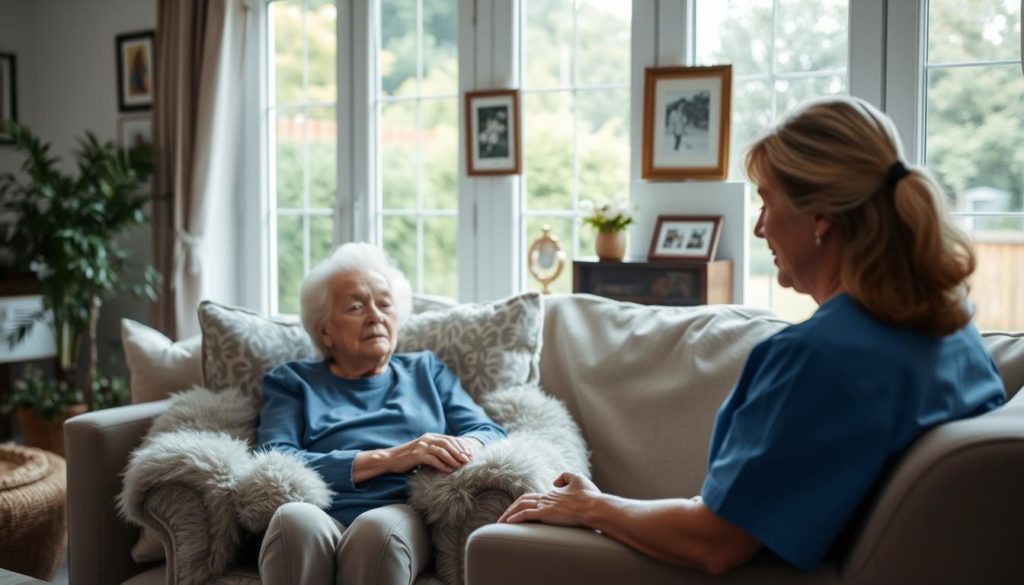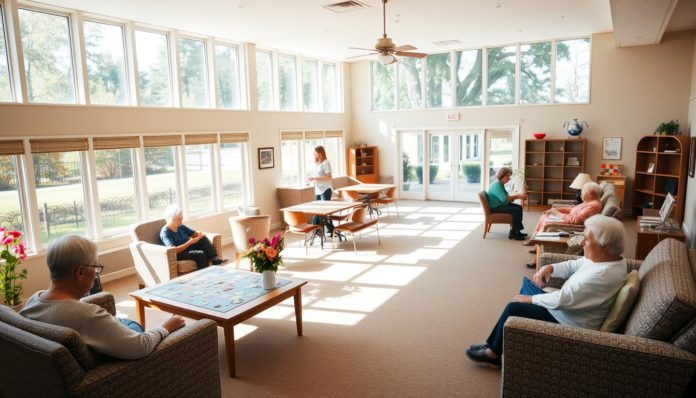Nearly 6 million Americans live with Alzheimer’s disease today. And the numbers are expected to grow. This makes finding caring and supportive places, like adult day care centers, really important.
Adult day care centers are a huge help for families. They offer a safe place for Alzheimer’s respite care for up to fourteen hours a day. These centers help avoid early placement in institutions by providing specialized care focused on both solo and group activities.
Adult day care centers build a sense of safety and involvement. They uplift people with Alzheimer’s. And they give families much-needed peace of mind.
Understanding Adult Day Care for Alzheimer’s
Adult day care facilities are key in offering care for those with memory loss. They have services specially designed for people with Alzheimer’s disease. These centers help improve life for those affected and give relief to their caregivers.

Benefits of Adult Day Care
Alzheimer’s day programs provide more than just supervision. They offer:
- Engaging activities that promote cognitive health and memory retention
- Social interaction to combat isolation and improve emotional well-being
- Access to professional care, including therapies and health monitoring
Preventing Unnecessary Institutionalization
Memory care programs aim to keep people out of institutions too early. These programs provide a supportive community. They offer:
- Structured routines that help reduce stress and confusion
- Individual and group therapies for specific needs
- Safety measures for a secure setting
Regulation and Licensing of Adult Day Care Facilities
Adult day care centers follow strict rules and need licenses to operate. For example, in South Carolina, they must follow Regulation 61-75. This rule means they have to meet certain health and safety standards. It helps ensure patients get good care and their rights are respected.
| Features | Benefits |
|---|---|
| Engaging Activities | Cognitive health, memory retention |
| Social Interaction | Combat isolation, improve emotional well-being |
| Professional Care | Therapies and health monitoring |
Learning about adult day care helps families choose the right Alzheimer’s program. It’s all about improving the lives of their loved ones and supporting caregivers.
Compassionate In-Home Alzheimer’s Care
Caring for Alzheimer’s patients at home is crucial for their comfort and well-being. It focuses on empathy, understanding, and meeting each patient’s unique needs. This helps them keep their quality of life while they stay at home.

Personalized Care Plans
Alzheimer’s in-home care offers tailored dementia care services. It can cover daily routine help, medication management, or cognitive activities. These plans adjust to patient needs over time, maintaining health and well-being.
Such care is key as it changes to meet the patient’s growing needs. It ensures care is always suitable and reliable.
Maintaining Independence
Helping seniors maintain their independence is a main aim of Alzheimer’s in-home care. At home, seniors can keep doing daily tasks that support their autonomy and self-reliance. This boosts their mental and emotional health by giving them control and dignity.
Sticking to familiar routines in known surroundings helps lower anxiety and confusion. This is important for those living with Alzheimer’s.
Respite Care for Family Members
Caring for a family member with Alzheimer’s is hard and can be emotionally draining. In-home services offer crucial respite care for these families. This allows them to rest and take care of their needs.
With professionals stepping in, families can be at ease knowing their loved ones are well cared for. This support helps both patients and their families maintain a healthy caregiving balance.
Memory Care Programs for Alzheimer’s Patients
Memory care programs meet the special needs of Alzheimer’s patients. They offer crucial support for thinking skills with diverse activities and methods. These programs improve life quality for patients. They help slow down cognitive loss and keep patients involved.
Activities to Support Memory
Alzheimer’s therapy activities are key to these programs. They match the activities to what each person can do and likes. This could be from puzzles to music sessions. Such activities sharpen the mind and bring emotional balance to seniors.
Cognitive Stimulation Techniques
Cognitive stimulation is a core part of these programs. Caregivers use methods like reality orientation and memory exercises regularly. These help with daily thinking tasks. They also ensure patients follow their medication schedules for all-around care.
Here’s a quick look at some common memory care activities and techniques:
| Activity/Technique | Purpose | Benefits |
|---|---|---|
| Reminiscence Therapy | Encourage recall of fond memories | Improves mood and reduces anxiety |
| Music Therapy | Stimulate memory and emotions | Enhances mood, promotes interaction |
| Reality Orientation | Reorient patients to current time/place | Reduces confusion, improves awareness |
| Puzzles and Games | Engage mind and memory | Boosts cognitive function, provides enjoyment |
The Role of Specialized Care in Managing Alzheimer’s
Specialized care is crucial for managing Alzheimer’s. It meets the unique needs of patients. Caregivers receive in-depth training. This helps them provide compassionate care.
They learn to handle tough behaviors and support everyday activities. Their goal is to improve life for those with Alzheimer’s.
Trained Staff and Caregivers
Caregivers get thorough training on cognitive and physical sides of Alzheimer’s.
- Comprehensive Training: This includes learning about Alzheimer’s progress, noticing what causes upset, and making personal care plans.
- Continuous Education: They keep up with new research and care methods through ongoing education.
- Empathy and Patience: Training also focuses on being empathetic, patient, and communicating well, building strong connections with patients.
Safe and Secure Environment
Alzheimer’s care facilities ensure patient safety and well-being. They offer state-of-the-art security and a supportive setting that helps patients stay independent.
- Enhanced Security: They have top-notch security, like secure doors, to prevent patients from wandering off.
- Personalized Spaces: Rooms are cozy yet adaptable to patient needs, making them feel less confused and more at ease.
- Health and Safety Protocols: There are regular health checks and strict safety rules to protect the residents’ health.
| Feature | Benefit |
|---|---|
| Advanced Security Systems | Prevents wandering and ensures patient safety |
| Personalized Living Spaces | Reduces confusion and enhances comfort |
| Continuous Health Monitoring | Maintains physical well-being with regular check-ups |
Specialized caregivers and safe facilities form a strong system for managing Alzheimer’s. They create a safe and supportive place for patients.
Senior Activities for Alzheimer’s Patients
Activities are key for Alzheimer’s patients. They help keep the mind and body active. Tailoring activities to fit their interests and abilities boosts their life quality. It’s good to have both group and personal activities to keep everyone engaged.
Group and Individual Activities
Group activities create a sense of community. Music therapy, arts, and crafts, along with exercise, stimulate their minds. They also help patients stay physically active. On the other side, individual activities like puzzles, reading, or gardening let them engage at their pace. This balance is crucial for overall well-being.
Importance of Social Interaction
Socializing is vital for dementia patients. It helps prevent feelings of loneliness and despair. Alzheimer’s patients flourish with regular interaction. This can significantly slow their mental decline and boost their mood. Engaging in regular social activities is essential.
Let’s look at how these activities benefit Alzheimer’s patients:
| Activity Type | Benefits for Patients |
|---|---|
| Group Activities |
|
| Individual Activities |
|
| Social Interaction |
|
Incorporating these activities is beneficial. They help make a real positive change in the lives of Alzheimer’s patients. Staying active and connected improves their quality of life significantly.
Choosing the Right Alzheimer’s Day Program
Finding the best Alzheimer’s day care needs thought on several factors important for your loved one’s well-being. Consider the staff’s skills and the activities available. Each part helps you make a good choice.
Start by figuring out what the person with dementia needs. Think about their comfort, how they move, and any medical care needed. Watching their daily activities helps see if the program fits their life.
Top-notch programs make sure their staff know a lot about Alzheimer’s care. They train them to meet the challenges dementia brings. Checking the variety of activities is key. They should improve brain health and allow social time.
Some places let families try the service to see if it suits their relative. This choice can be very telling. The cost for services differs a lot. Yet, some places adjust prices based on what you earn. It’s smart to ask about help with costs. For tips on picking day centers, look at this guide.
| Considerations | Details |
|---|---|
| Staff Training | Ensure comprehensive training in Alzheimer’s care |
| Activities Offered | Diverse activities focused on cognitive stimulation |
| Trial Periods | Check if the center offers trial periods |
| Cost and Financial Assistance | Explore sliding scales and assistance options |
Choosing the best Alzheimer’s day program means doing your homework and keeping an eye on how things go. A place that feels caring and active can really improve life for someone with Alzheimer’s. It helps them stay as independent and happy as possible.
Ensuring Safety and Comfort in Memory Care Centers
Memory care centers put the safety of Alzheimer’s day care first. They also aim to make dementia care settings comfy. Their goal is to develop a supportive environment for people with Alzheimer’s.
The design of these centers is important for comfort in dementia care. They have secure doors and easy-to-navigate spaces. They plan everything to reduce confusion and prevent accidents. Features like emergency calls, floors that prevent slips, and safe outdoor areas are essential. These let patients enjoy the outdoors safely.
Training staff is key for Alzheimer’s day care safety. Workers learn a lot about caring for people with dementia. This includes how to spot when someone is upset and how to help. They’re also ready for emergencies. This makes sure everyone knows what to do in a crisis.
These efforts make both patients and their families feel better. Safety and comfort are the main goals. Memory care centers want their residents to get excellent care. They ensure patients feel valued and safe.
| Safety Feature | Importance | Benefits |
|---|---|---|
| Secure Entry Points | Prevents unauthorized access and ensures patient safety. | Reduces the risk of wandering and enhances security. |
| Non-Slip Flooring | Prevents falls and injuries. | Maintains a safer environment for mobility. |
| Emergency Call Systems | Provides immediate assistance during emergencies. | Ensures quick response to health crises. |
Support Systems and Resources for Alzheimer’s Caregivers
Caring for someone with Alzheimer’s is hard, but support and resources are out there. You can find local and national groups ready to help. They offer information, teach caregiving skills, and give emotional support.
Community Resources
Community resources are key for Alzheimer’s caregivers. Places like Area Agencies on Aging offer rest programs, support groups, and learning materials. They focus on Alzheimer’s care, giving caregivers a needed break and practical help.
National and Local Organizations
The Alzheimer’s Association is one resource that offers a lot. They have helplines, websites, and local chapters with groups and workshops. They help caregivers connect with the support they need.
Professional Support Options
Professional support includes healthcare providers, occupational therapists, and social workers. They are crucial for caregivers. These experts can create personal care plans, answer health questions, and help with daily challenges.
- Healthcare Providers: Offer medical advice and treatment plans.
- Occupational Therapists: Help with adapting daily activities to meet patient needs.
- Social Workers: Provide emotional support and connect families with community resources.
Navigating the Costs of Alzheimer’s Day Care Services
Figuring out how to pay for Alzheimer’s care can be overwhelming. Yet, there are strategies to handle these costs. Early planning is key. It lets families check out many funding ways and decide wisely about the care.
There are lots of places to get help with the costs. The Program of All-Inclusive Care for the Elderly (PACE) is one. It covers a lot, including Alzheimer’s day care, which can mean less money needed from families. Also, things like Medicaid and help from Veterans Affairs are super helpful for those who can get them.
Looking for more help? Nonprofits and community groups often give grants and other help for those dealing with Alzheimer’s. A great first step is to visit the Alzheimer’s Association website. They have a lot of information on money help. Planning early and knowing these options can really help. It means your loved one gets the care they need without big money worries.
FAQ
What are the primary benefits of enrolling in an adult day care center for Alzheimer’s?
Adult day care centers provide therapies tailored to Alzheimer’s patients. They offer a supportive community. This helps avoid unnecessary hospital stays.
How do adult day care centers help prevent unnecessary institutionalization?
They offer activities and therapies for engagement. This promotes well-being, reducing the need for more intensive care.
What regulations and licensing requirements do adult day care facilities need to follow?
They must follow specific rules like South Carolina’s Regulation 61-75. This ensures they provide high-quality care and meet legal standards.
How does in-home Alzheimer’s care maintain independence for patients?
It offers care plans that let patients stay at home. This keeps their routines and offers comfort and security.
What is respite care and how does it benefit family members of Alzheimer’s patients?
Respite care gives family members a break from caregiving. They find peace knowing their loved ones are in good hands.
What activities support memory and cognitive stimulation for Alzheimer’s patients?
Activities include puzzles, arts, music therapy, and exercises. These support memory and cognitive skills.
What kind of training do specialized Alzheimer’s caregivers receive?
They get training on the needs of Alzheimer’s patients. They learn to create safe, supportive environments for better life quality.
Why is social interaction important for Alzheimer’s patients?
It helps maintain mental health and slow cognitive decline. Activities create a sense of community, vital for emotional health.
How should families choose the right Alzheimer’s day program?
Consider the patient’s needs, care quality, staff training, and activities. See how the program supports the patient’s well-being.
What measures ensure safety and comfort in memory care centers?
Centers design secure environments and provide staff training. They also focus on emergency preparedness for patient safety and comfort.
What support systems and resources are available for Alzheimer’s caregivers?
Caregivers can find help from community resources, organizations like the Alzheimer’s Association, and professional options. This helps them manage dementia care challenges.
How can families manage the costs of Alzheimer’s day care services?
Look into financial assistance from programs like PACE, nonprofits, and federal benefits. These can help with day care costs.


